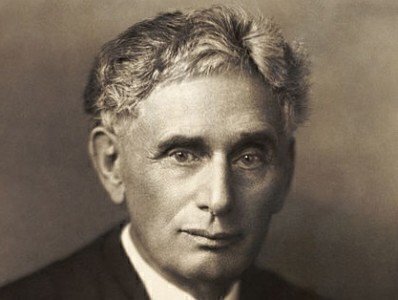Today we celebrate the birthday of Justice Louis Brandeis, who made a lasting impact on American constitutional law both before and while he was a justice on the Supreme Court from 1916 to 1939. From Brandeis briefs to the right to privacy to a focus on pro bono work, Justice Brandeis shaped the development of both law and the legal profession, and he is widely regarded as one of the most influential figures to ever serve on the Supreme Court.
 On November 13, 1856, Louis D. Brandeis was born in Louisville, Kentucky to immigrant parents who had arrived in America from Bohemia less than 10 years earlier. By age 18, Brandeis was studying at Harvard Law School, and shortly thereafter graduated with one of the most impressive academic records in the school’s history. By 1890 Brandeis was beginning to make meaningful contributions to legal scholarship and published the now-famous article, “The Right to Privacy” in the Harvard Law Review. It was in that article that the right to privacy as we know it was first articulated, as Brandeis foreshadowed his judicial philosophy as a Justice, writing that “political, social, and economic changes entail the recognition of new rights.”
On November 13, 1856, Louis D. Brandeis was born in Louisville, Kentucky to immigrant parents who had arrived in America from Bohemia less than 10 years earlier. By age 18, Brandeis was studying at Harvard Law School, and shortly thereafter graduated with one of the most impressive academic records in the school’s history. By 1890 Brandeis was beginning to make meaningful contributions to legal scholarship and published the now-famous article, “The Right to Privacy” in the Harvard Law Review. It was in that article that the right to privacy as we know it was first articulated, as Brandeis foreshadowed his judicial philosophy as a Justice, writing that “political, social, and economic changes entail the recognition of new rights.”
Brandeis was also a successful practicing lawyer which allowed him to offer his services for free to support various causes in the public interest. He fought ardently and mounted successful legal challenges against big business and government-sponsored monopolies, and defended the interests of the least well off in society.
A highlight of Brandeis’ career as a defender of the public interest came in 1908 when he filed a revolutionary brief in the case of Muller v. Oregon. In 1905, the Supreme Court decided in Lochner v. New York that state laws that regulate economic activities, like minimum wage and maximum hours laws, violate the substantive economic due process rights guaranteed by the 14th Amendment.
Shortly after Lochner, a female worker sued her employer after he made her work more than ten hours a day, which violated Oregon’s maximum-hours law for women. The case was appealed all the way to the Supreme Court, where the employer argued that the maximum-hours law violated his economic right to freely contract.
Brandeis was part of the legal team tasked with defending the Oregon statute, and he needed to come up with a strategy to show that the state government had the right, under its police powers, to regulate these sorts of economic behaviors. To articulate the need for these sorts of regulations, he filed a brief that focused on health reports and social science data rather than strictly legal sources. It was the first time this sort of brief, now called a Brandeis Brief, was filed, and eventually contributed to the Supreme Court’s decision to uphold the maximum-hours law.
In 1916, President Woodrow Wilson nominated Brandeis to the Supreme Court. His nomination was contentious, and while former President Taft labeled him a radical, and other opponents launched anti-Semitic attacks against him, he eventually ascended to the Court on June 5, 1916.
Informed by his earlier legal research and career defending the public interest, Justice Brandeis was a staunch defender of civil liberties and individual rights. In Olmstead v. U.S. in 1928, Brandeis issued a now-famous dissent while the majority ruled that the Fourth Amendment does not ban wiretaps that were performed without a warrant.
Channeling his broader legal philosophy and the right to privacy he articulated years earlier, Brandeis explained that individual rights guaranteed by the Constitution ought to be seen as evolving and expanding along with the development of technology and progression of society. He wrote that “in the application of a constitution, our contemplation cannot be only of what has been, but of what may be” and said that the essence of the Fourth Amendment clearly banned these sorts of violations of privacy. Though the Court rejected Brandeis’ conception of privacy at that time, later jurisprudence, starting with Griswold v. Connecticut in 1965, heavily relied on the groundwork Brandeis laid down in Olmstead.
Justice Brandeis penned another famous opinion in 1927, in his concurrence in Whitney v. California. While Brandeis voted to uphold a conviction based on a law that banned speech and association regarding the Communist Party, he explained why he saw free speech as important. Brandeis wrote that free speech is integral to the functioning of a democratic society, and because of this suggested that the Court adopt a stricter standard for speech regulation that went beyond the reigning “clear and present danger” standard. Again, while Brandeis’ opinion was not fully accepted at the time, it foreshadowed the 1969 opinion in Brandenbrug v. Ohio, which established a much more demanding standard for judging regulations on speech.
Through his influence on the Supreme Court, constitutional law, and American society, the legacy of Justice Brandeis continues to live on.







